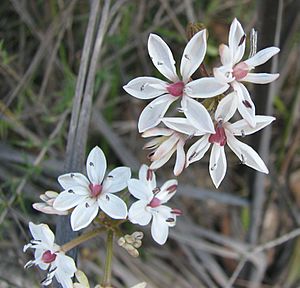Burchardia umbellata facts for kids
Quick facts for kids Burchardia umbellata |
|
|---|---|
 |
|
| At Anglesea Heath | |
| Scientific classification |
|
| Kingdom: | Plantae |
| Clade: | Tracheophytes |
| Clade: | Angiosperms |
| Clade: | Monocots |
| Order: | Liliales |
| Family: | Colchicaceae |
| Genus: | Burchardia |
| Species: |
B. umbellata
|
| Binomial name | |
| Burchardia umbellata |
|
| Script error: The function "autoWithCaption" does not exist. | |
Script error: No such module "Check for conflicting parameters".
Burchardia umbellata is a pretty plant often called milkmaids. It's a type of perennial herb, which means it's a plant that lives for more than two years. You can find it growing naturally in woodlands and open heath areas across eastern and southern Australia. It grows in all Australian states. Milkmaids usually bloom with flowers from September to November. They like to grow in dry sclerophyll forests, which are forests with tough, dry leaves.
Contents
What Does It Look Like?
The milkmaids plant has long, thin leaves. They can grow up to 60 centimeters (about 2 feet) long. These leaves are usually about 1.5 to 4 millimeters wide.
White or light pink flowers grow in clusters on top of a thin stalk. This stalk can reach 50 to 60 centimeters (about 2 feet) high. Each flower is about 2.5 centimeters (1 inch) wide. The flowers often have reddish centers, making them look even prettier.
At the bottom of the plant, there are up to ten carrot-shaped tubers. These tubers are like small, thick roots. Each one is about 5 millimeters thick.
Can You Eat It?
Yes, you can! Aboriginal people have traditionally eaten the potato-like tubers of the milkmaids plant. These tubers can be eaten raw or cooked. They are white, soft, and crunchy. They are also starchy, like a potato. The taste is quite mild.
Where Did Its Name Come From?
The plant's scientific name, Burchardia, honors a German botanist named Johann Heinrich Burckhardt. The second part of the name, umbellata, comes from a Latin word meaning "umbrella." This refers to how the flowers grow in clusters that look a bit like an umbrella.
Growing Milkmaids
You don't often find Burchardia umbellata in plant nurseries. However, you can grow it from seeds. It can also be kept in containers. This plant needs soil that is moist but also drains water well. It likes to grow in sunny spots or places with a little bit of shade.
See also
 In Spanish: Milkmaids para niños
In Spanish: Milkmaids para niños
 | Delilah Pierce |
 | Gordon Parks |
 | Augusta Savage |
 | Charles Ethan Porter |

